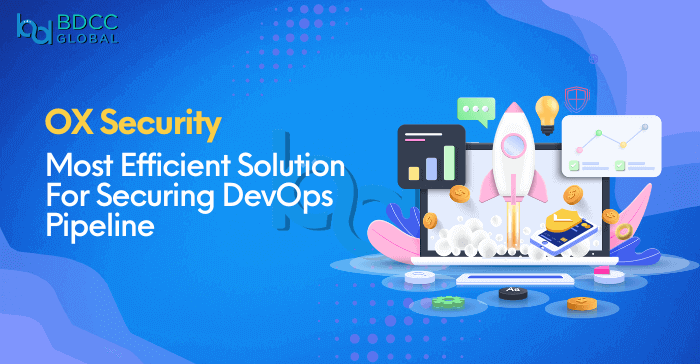
Are you concerned about the security of your DevOps pipeline? With the rise of cyber threats and the increasing reliance on digital infrastructure, securing your pipeline is more important than ever. That’s where OX Security comes in – the game-changing method for securing DevOps pipeline.
OX Security offers a comprehensive suite of tools and services to protect your pipeline from potential threats, including real-time threat detection, vulnerability scanning, and secure access controls. OX Security provides unparalleled protection against known and unknown threats by leveraging advanced machine learning and AI technologies. So if you want to ensure the safety and integrity of your DevOps pipeline, look no further than OX Security.
“In the age of DevOps, security is no longer an afterthought, it’s a first-class citizen.”
Challenges Of Traditional Security Methods For Securing DevOps
Rapid Development
DevOps has significantly increased the pace of change in software development and deployment. Previously, new infrastructure was provisioned with new hardware, which had a long cycle between request and availability. Also, the latest updates were released once a few months. But with the introduction of the DevOps principle, the modern-day development environment witnesses multiple releases in a day. The traditional security methods are not designed to handle such rapid changes, making the software supply chain security vulnerable.
Ensuring Cloud Security
Cloud-first architecture poses a security concern. Because the network boundaries are unclear, it increases the attack surface and makes it simple for any resource to have public access with just a few clicks. Network security practices in the past presupposed that the network’s borders were clearly defined, with few well-established entry and exit points. Cloud-based solutions, however, are different. This makes cloud security a problem that needs to be solved to guard against potential dangers.
Embracing the Concept of Serverless Computing
Serverless computing, a term that denotes a cloud computing model in which the cloud provider usually manages infrastructural resources, has gained significant attention in recent years. In this model, the cloud platform also takes charge of the security aspects of the applications hosted within it. However, despite its potential benefits, organizations face particular challenges when migrating to a serverless computing environment, including DevOps secure software supply chain practice.
Exploring the Interwoven Nature of the DevOps Process
DevOps, a collaborative approach that emphasizes the integration of development and operations teams, is characterized by its interconnected nature. This interconnectedness facilitates the interchange of valuable information among the teams, which includes sensitive credentials.
Various systems, such as applications, microservices, containers, tokens, and share passwords in a DevOps environment. This poses a severe security threat to DevOps development as each stage is interconnected. Therefore, any weakness in one stage can quickly propagate to the others, causing widespread damage.
Collaboration in DevOps Environments
Legacy security tools, technology, and processes were not initially designed to address DevOps practices’ unique challenges. Traditional siloed approaches, where security and engineering teams operate independently, must be more scalable in a DevOps-first culture’s fast-paced, iterative nature. Operating in isolated bubbles, these teams may end up duplicating operational efforts and hindering supply chain security management efficiency that could otherwise be consolidated in a unified manner.
What is OX Security?
OX is a comprehensive DevOps solution designed to enhance the security and integrity of the software supply chain in modern CI/CD pipelines, spanning from the cloud to the code. OX is specifically built to address the evolving risks associated with supply chain vulnerabilities, such as those seen in incidents like Solarwinds and Log4j, due to the rapid transformation to agile development, microservices, and integration of open-source components.
It enables the DevOps team for securing DevOps by automating decisions based on valuable security-led insights. It provides capabilities to produce and consume pipeline BOM (Bill of Materials), allowing for better visibility into the components used in the software supply chain. By analyzing the BOM, OX can identify potential risks or misconfigurations that may impact the security of the developed and deployed software.
How Does OX Security Work?
OX examines your code repository (such as GitHub, GitLab, Bitbucket, or Azure Repos) and maps your pipelines to find security flaws and incorrect setups. It checks to see if your current security tools are connected and working while automatically deploying various security tools like static analysis, open source security, SAST, secrets scan, containers scan, IaC scan, and CSPM for securing DevOps.
It gives mechanical repairs and recommendations and ranks the security flaws according to how they might affect the business. For each pipeline build, OX generates a signed knowledge graph called PBOM to guarantee production security. It connects with IDEs and works with Jira, Slack, and other platforms for seamless team communication.
Final Thoughts
If, as an organization, you are trying to build a reliable and secure application, then it is essential to comply with the regulatory requirements and incorporate the latest and comprehensive security software solutions like OX security. This is a pioneer in the software supply chain security game and provides an end to end traceability.
The software automatically identifies and blocks the vulnerabilities and personally notifies the concerned person. All these measures help you gain the customers’ loyalty. So, why are you waiting for? Explore OX Security for a robust and reliable approach to securing DevOps development processes.
BDCC
Latest posts by BDCC (see all)
- Four Steps to Balance Agility and Security in DevSecOps - April 22, 2025
- Enhancing Security Posture with Azure’s AI-Driven Threat Detection - April 15, 2025
- Why Golang is Becoming the Go-To Language for DevOps Engineers - April 11, 2025

